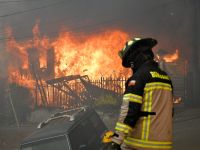Nationwide demonstrations in the Netherlands against new measures to curb the spread of the novel coronavirus sparked clashes Monday between protesters and police.
Hundreds of people gathered in cities to protest the measures, with the demonstrations descending into rioting and looting, according to local sources. At least 70 people were detained.
Curfews have been imposed in The Netherlands for the first time since WWII.
— Amanda Marochko (@Marochko) January 25, 2021
And the unrest is honestly quite frightening. #avondklokrellen pic.twitter.com/XGrfKticmH
The protestors attacked police with fireworks and stones during the rally in Rotterdam and looted shops. The police department was also attacked with fireworks.
Police intervened with dogs and water cannons as the demonstrations turned into riots.
Similar incidents took place in a number of cities including Amsterdam, Haarlem, Geleen, Helmond, Zwolle, Amersfoort, Den Bosch and Tilburg and cars were burned.
The Netherlands on Jan. 12 extended lockdown restrictions until at least Feb. 10 due to a new variant of the virus that is said to be more contagious and perhaps more deadly.
Riots have broken out in the Netherlands after the first night-time curfew since the Second World War was imposed in a bid to tackle #COVID19.
— Sky News (@SkyNews) January 25, 2021
Click here to read more: https://t.co/RRcn1pVkZj pic.twitter.com/1oT9OyAaLe
Restrictions were further tightened on Jan. 23 with the enforcement of a nationwide curfew between 9 p.m. and 4.30 a.m., a first since World War II.
People are advised to stay home and only go out to shop for essentials, get medical care, go to work or attend school if learning remotely is not possible.
This article has been adapted from its original source.








